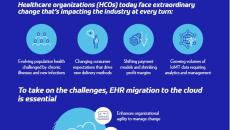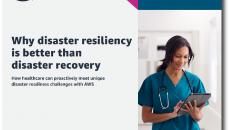Electronic Health Records (EHR, EMR)
Join leaders from Scripps and Monument Health as they talk with DrFirst’s CMO, Colin Banas, M.D., M.H.A., about their real-world uses of AI-powered solutions to help clinicians save time and enhance care delivery.
Cone Health is one of the largest health networks in North Carolina, with more than 100 locations. Pharmacists often had to make multiple phone calls to confirm a patient's medication list, then manually enter the information into their Epic electronic health record (EHR) system, increasing the likelihood of human error, and the potential for...
Face-to-face medication history interviews during the patient intake process in Covenant HealthCare’s emergency department (ED) were eliminated at the start of the pandemic in 2020.
As healthcare organizations (HCOs) transition from fee-for-service to value-based care models, healthcare leaders must determine how to enable data sharing across their organizations to improve care delivery and patient outcomes. Integrating their electronic health record (EHR) platforms with cloud-based systems such as Salesforce Health Cloud can...
Sponsored
The growth of Sharp Healthcare, the largest health system in San Diego County, has generated millions of additional patient records and back-office documents. Like other health systems, staff working within EHR, ERP and other core systems did not have the ability to easily access, integrate and process medical records and other supply chain...
Sponsored
Having real-time insights into every experience that matters allows healthcare organizations to understand the patient journey from end-to-end, connect feedback from multiple data channels, make data-driven business decisions that improve their bottom line and drive action at every level to deliver on patient and employee expectations.
Sponsored
Healthcare organizations are facing extraordinary change that’s impacting the industry at every turn, including changing consumer expectations, shifting payment models and growing volumes of IoMT data requiring analytics and management. Migrating EHR systems to the cloud can enhance an organization’s agility, as well as strengthen...
Sponsored
Healthcare organizations must be able to pivot quickly and respond to today’s ever-changing environment. An increasing number of organizations are moving their electronic medical records (EMRs) to the cloud as part of their digital transformations. Why? The cloud offers a means to update aging infrastructure and also adopt modern EMR...
EHR deployment in the cloud can help HCOs shift their resources from managing IT infrastructure to improving care coordination, revenue cycle management and patient outcomes.
Sponsored
Having a proactive, comprehensive disaster resiliency plan that identifies, protects against and detects threats can avoid or minimize the impacts of disasters of all sizes.




























